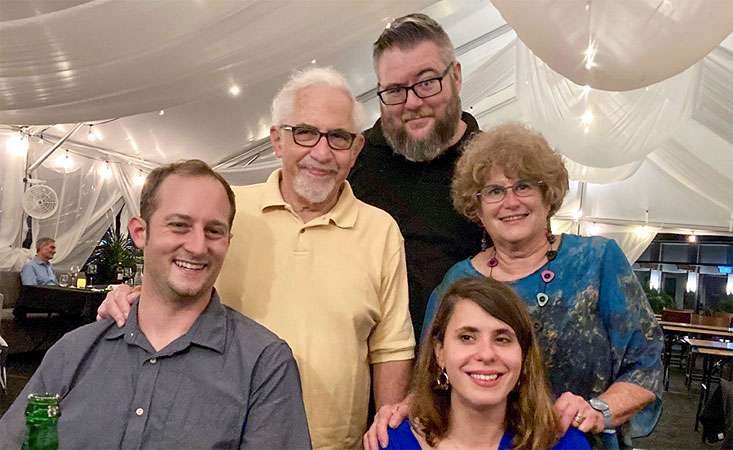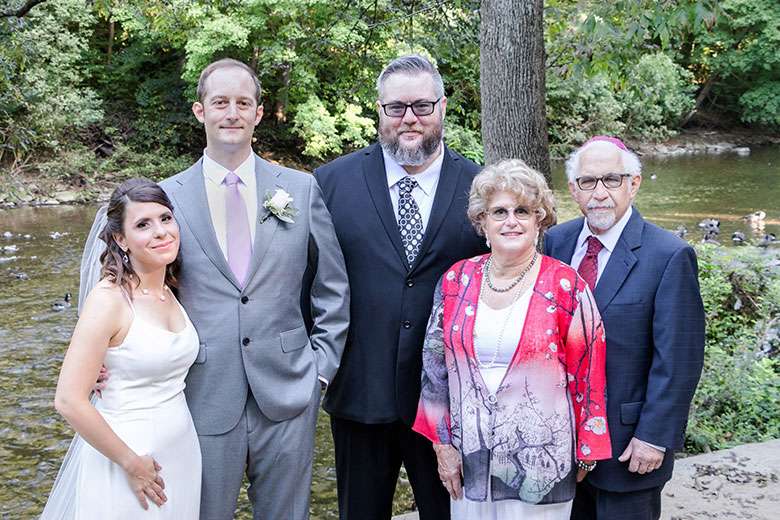
Dr. Elliott Schulman, a pancreatic cancer survivor, with his sons, daughter-in-law and wife.
Editor’s note: On National Book Lovers Day, we share a blog written by Elliott Schulman, M.D., who has just written a handbook on living a meaningful life – with cancer.
I did not consider cancer. Feeling relatively well, I considered my 5 to 10-pound weight loss a result of eliminating desserts. It was my elevated liver function test that made my doctor suspect something else.
When given the diagnosis of pancreatic cancer, my only hope for a cure would be surgery, but it was not an option at that time. Even with my medical knowledge, I felt lost and numb.
Plagued by memories of my medical school roommate who had died of the disease 12 years earlier, I remembered his physical and emotional decline. How long could I maintain a productive lifestyle? My son had set a wedding date. Would I make it? Would I ever spend time at the Delaware beach again? At 73, I had chosen not to retire. I had been a neurologist for over 40 years and remaining in practice was a priority for me. There was a lot more I wanted to experience.
I remember feeling hopeless, crying a lot and blaming myself for the tumor. I needed a new perspective. I decided to think about this disease as an adversary in a card game; an enemy on the battlefield. To beat it, I was ready for battle and determined to use all the tools at my disposal. My friends provided their support as my army. My wife was appointed the Battalion Commander. I would take the steps, play the hand, and wage the war, but I would do none of this alone.
To help others in a similar situation, I have decided to share my story and provide some suggestions on coping with their disease. It is my hope this will serve as a useful starting place for patients and contribute to their emotional healing.
Know Your Options and Get Practical Support
I have very little recollection of what happened in the early days after my diagnosis. I don’t know whether I was too sedated, overwhelmed or just blocked it out. Having my wife there helped ensure nothing was missed.
Try to remember that roadblocks will occur and are not uncommon. Your symptoms may change in intensity and progression. Lab results may yield disappointments and welcomed surprises, punctuated by both good and bad days. It can feel like a roller coaster.
Regardless, you need to be the forklift that moves the roadblocks aside, opening the path for patient advocacy.
Being your own advocate can feel simultaneously empowering and arduous. When you have cancer, so many things feel out of control, so maintaining control, in ways large or small, will help your mood. However, there are times when you may be physically or emotionally exhausted, and that is why fortifying your team of advocates is salient.
Gathering information is also a form of advocacy. Come to your doctor with a list of questions and make sure you have a clear understanding of the answers.
It is important to make sure you are comfortable with your treating physician. You need to believe your physician is invested in your care and is accessible. This will help you when you begin the next steps of your treatment. You should be aware of your options and their success rates, side effects and how they may impact your access to other potential options in the future.
Family members, especially those who are detail-oriented and proactive, can also prove to be incredibly effective advocates.
Get Emotional Support
I have been a giver my whole life, enjoying this role. It has made me a better husband, father, and physician. I needed to reexamine this role so I could create boundaries while still being true to my nature.
Sometimes when friends wished to call or visit, I wasn’t eager to engage with them. At times, I just wanted to be by myself and not wanting to offend anyone. A good friend gave me excellent advice: Your priority should be doing what makes you feel most comfortable. Put yourself first. It was up to me to set some boundaries. I was being fair to myself.
One way in which I have learned to practice self-care is allowing myself to be emotional. To express my feelings without judgment. Whether good or bad, positive, or negative, I have experienced more feelings than I ever knew I had. It was important to share my mood with my family members, while also making sure to keep my doctor abreast of my feelings. It is something I emphasize with my own patients and consider it to be an extremely important part of any treatment. Physicians need to focus on physical complaints, as well as mood.
Since my diagnosis, my emotions have often been expressed by crying. Crying doesn’t always mean I am upset. Sometimes I cry because I am touched by another’s concern, their kind words, or their generosity. But much more often, I cry because of anxiety, fear or depression and the stress related to my tumor. The COVID-19 pandemic further impacted my plans with fears of being infected by the deadly virus.
I try to stay in the present, but it takes effort. Meditation, prayer, and purposeful activity keep me grounded. I can also gain strength and peace by speaking to supportive relatives and friends.
My wife is very good at keeping me in the moment. When I just can’t get a grip, she grabs my hand, looks me in the eye and says, “You’re here today. Thankfully, you feel well. Let’s focus on that.” It works.
I also strongly recommend you secure a therapist. Cancer can be a frightening disease. You may feel out of control. Therapists can supply words and perspectives that make a stressful time more tolerable. My therapist has helped me gain perspective on a wide variety of challenges since my diagnosis.
I have also found inspiration from other patients I have met while in chemotherapy, and friends who are also facing cancer. The selfless nurses who devote their lives to compassionate care have provided me with courage, camaraderie, and calm.
Enjoy the Moments
This disease will change you. I have a fresh perspective on my struggles, my relationships and what is important in this stage of my life. I no longer take the small things for granted, finding awe in things I never even noticed prior to my diagnosis.
I would not have wished for this disease but have grown in ways I could never have imagined. Rather than this disease limiting me, it has provided me insights and an appreciation for the life events that have helped shape me.
One insight that surprised me more than any other: gratitude. Each day is different, with some days better than others. I am thankful for the good days and for all the positives in life I have been blessed with. I am grateful for time at the beach where I am content watching and listening to the waves, walking in town, watching people, and eating my favorite ice cream.
Nothing gave me a greater sense of gratitude than being able to participate in my son’s wedding. He and his fiancée had planned their wedding for early September 2020. As the date approached, we realized a big wedding wasn’t in the cards. Nonetheless, my hope to attend the wedding was thankfully realized. In a small ceremony, we celebrated this special occasion with 21 guests, heartfelt vows and lovely toasts. It was perfect!

Dr. Elliott Schulman and family at his son’s wedding in September 2020.
I have realized that with my disease, like life, change is a constant. There are good times as well as challenging times. This perspective helped me accept change. And maybe when the down days occur, I recognize them as part of a cycle. It allows me to continue working on maintaining a positive attitude, and hopefully, anticipate better days ahead.
Throughout this process, I have needed a purpose. I took to writing a “handbook,” hoping it will help patients struggling with cancer. This was my first step in fighting this disease. It has helped bring me clarity and peace. As I continue my journey, I look forward to further growth as I direct my energies to defeating this disease.
One page, one tear, and one day at a time.
Dr. Elliott Schulman was born in Buffalo, N.Y. After his graduation from medical school, he trained at Georgetown University Hospital, finishing his residency in Neurology. He moved to the suburbs of Philadelphia, where he continues to practice neurology. He has written several scientific papers and lectured extensively. He is married and has two sons, and a new daughter-in-law, as well as two rescue dogs, Lilly and Jax. He and family participate in PanCAN’s PurpleStride Philadelphia, with their team, “Elliott’s Army.”
Dr. Schulman and Dr. Moss Jackson, a clinical psychologist who specializes in trauma and anxiety, have worked together on a handbook titled, “Seeing the Light While Living with Cancer: How Adversity Can Teach Us to Live a Meaningful Life,” to help others diagnosed with pancreatic cancer. It is available for purchase here.





